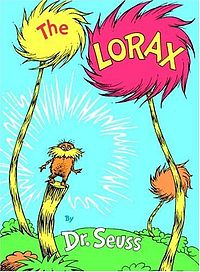What is Environmentalism?
With the movie version of The Lorax hitting theaters this weekend, man’s role in shaping and caring for the environment is back in focus for parents and kids. The message that we ought to protect and nurture our environment is not a new one—it’s been around for decades now, and can be traced back through the conservationist and anti-industrial movements of the last two centuries. But of course, “care” for the natural world has changed quite a lot, and with the influence of writers like Rachel Carson and leftist politics of the 1960s, so have our cultural messages on the subject. Today, the landscape of the movement spans quite a range, from Christian and secular conservationists to environmentalists to full-fledged nature-worshipers. Environmentalism is admittedly a squishy word. But for our purposes today, it’s the idea that the environment ought to take precedence over human needs and wants.
Kid’s literature has not been immune to these changing influences. What may be found in any library or bookstore would probably sadden a lot parents who want to shield their children from some of the more radical elements of environmentalism. But there are still quite a lot of gems to be found, too.
Janie and I have put together a list of some of the issues that parents and children will face on this topic. And while we can’t cover every facet of the debate, we hope that this primer will give parents an overview of what is out there, and a few thumbnails on how to choose books that represent their values. Today in Part One, we cover two segments of the series: 1) Common Ground, and 2) The Myths. Next week I hope to look more closely at particular genres, as well as give parents a list of books they can use to discuss these issues with their kids.
Common Ground
Perhaps one of the most important ways that environmentalism overlaps ideas of Christian stewardship is that it affirms the value of the natural world. As opposed to worldviews which would demean the natural world, Christians and environmentalists can agree that the natural world has inherent value and is not merely a tool for self-aggrandizement. Abuse of the natural world is a real threat, and it is morally reprehensible. Much more could be said, but I think this is the heart of where we can find common ground.
The Myths
1. Sustainability vs. Stewardship/Dominion:
Sustainability is a term that was on the fringes only ten years ago, but today it is the buzz-word on how man should relate to his environment. According to the Environmental Protection Agency, “Everything that we need for our survival and well-being depends, either directly or indirectly, on our natural environment. Sustainability creates and maintains the conditions under which humans and nature can exist in productive harmony….” It encapsulates the view that earth’s resources are good but limited, and they must be protected in order to be maintained. Who doesn’t want that?
As with most buzz-words, sustainability contains hidden assumptions that may be helpful to spell out. Here are a few:
-
Fall/Redemption: Because American culture doesn’t believe in a real fall, we also don’t believe in a real, coming redemption in which the lion will lie down with the lamb. The Bible-believing Christian, however, sees the world as far more wrecked and perverted than the most sensitive environmentalist because we believe, unlike evolutionists, that death is not natural. It is a terrible intrusion, and one that reflects the very real severing of man’s relationship with God. Global warming is but a blip on the screen of a Christian’s idea of the danger humankind and our world is already in—and the “groaning of Creation” (Romans 8:19-22) will continue, “red in tooth and claw,” until we are not merely sustained, but redeemed. This is a crucial point when it comes to literature, because so many writers (Christian and non-Christian) have identified and wrestled with man’s separation from the natural world. See William Faulkner’s The Bear. But to see this apart from our separation from God is to look for a very different kind of redemption—one that often involves government in the place of God and an unrealistic view of the kind of relationship man can have with the rest of Creation before the Lord’s return. At its most basic level, sustainability is how we hope to restore a right relationship between man and the natural world without God or His redemption.
-
Stewardship/Dominion: Until Creation’s redemption, man is charged not only with sustaining the earth or finding some “productive harmony,” but we are to exercise loving, God-honoring dominion (Genesis 1:28). What this actually looks like in practice is a very difficult question to answer. Whatever else it looks like, though, it certainly means that sometimes earth and its resources should be spent. Sometimes the natural world ought to be tamed or made “unnatural,” though this shouldn’t be done merely for amassing wealth (something that will happen among sinful beings). Just as Christ Himself spent His life for others, there are times one species or habitat may need to be sacrificed for another species or for humans. A perfect example of this kind of loving dominion would be the use of DDT, which harms certain wildlife (including mosquitos!), to keep children from dying of malaria. Just as Abraham believed that God would bring Isaac back from death and so was willing to lose him if needs be, so we ought to go forth with great trepidation and humility, yet with the hope that God can bring back what He calls us to give up, even in terms of environmental loss. It is not in our calling to redeem all of nature, and to presume we ought to or even could do so would be folly and terrible waste of invaluable time and energy. We may or may not die of Global Warming, but we will die of something and stand before our Maker. Better then to focus on the ark He is building to escape destruction than one of our own imagination.
2. Man as a Negative: Man is merely a consumer in most environmentalists’ minds—he eats, takes from the land and animals, and gives only suffering in return. The best thing humankind can do in this scheme is to lessen impact, which in the most radical circles means to stop having kids, and eventually die off. Yet as humans go down in man’s estimation, animals are almost always elevated. This means animals are often believed to have the same rights as humans: see PETA and the killer whale that “sued” Sea World.
The Biblical view is quite different from this, putting man at the top of the pyramid in terms of ability to do both good and evil. And while it’s true that oil reserves are limited, man’s capacity for creativity, like His Creator’s, is not. At least, it’s not when we walk humbly with our God. And only through that God-dependent creativity can we exercise loving dominion—not merely using resources, but CREATING them out of raw materials to be used in the first place. Consider the fact that crude oil was itself just another puddle in the ground before someone figured out how to use it for something. And if we are able to discern and ameliorate man’s negative impact, it will be through the exercise of our dominion for positive impact—not our abdication (Psalm 8:6-8).
3. Species-ism: Environmentalism today is based on an evolutionary view of life, and as such, it puts a very high value on species. If you read Earth Matters, an environmental encyclopedia for kids published by DK, you’ll be told that something like 30,000 species are dying off every year. This is supposed to tell us that a holocaust is going on in the natural world. Now, when God made the animals after their kind, and when Noah saved male and female of each of the animals, the Lord certainly expressed his regard for something akin to species. But we are also told by Jesus Himself that not one individual sparrow falls to the ground apart from the knowledge of God. In Luke 12:6, we are told that not one is forgotten by God. We ought to care about species, but ultimately, the Christian view of redemption goes much farther than that. It reaches to individual people and animals, and in doing so, gives them a far greater value than they have in a purely evolutionary framework.
4. Apocalyptic Visions: Very common among environmentalist writing is the idea of a coming apocalypse, and this has been true long before global warming. From nuclear war to old-fashioned pollution to killer bees to over-population, there have always been real or imagined threats to latch on to. See Earth in the Balance, An Inconvenient Truth, etc. Behind the sustainability rubric is the implication that life as we know it now is NOT sustainable. In other words, there will be cataclysmic destruction if we don’t figure out a new way to “sustain.” Man absolutely does have the ability to end civilization as we know it. Nuclear war between a couple of super powers could easily do the trick. But we ought to be very, very careful before we come to the conclusion that an oil spill or killer bees are on the equivalent of nuclear war. Why?
5. Science and Politics: It’s the apocalyptic nature of environmentalism that makes it most dangerous. If we are faced with a “clear and present danger,” if we really are facing a threat just as nefarious as nuclear holocaust, then who wouldn’t be willing to give up their individual rights to meet that threat? This is how environmentalism can be used to break down property rights and basic freedoms—which inevitably revert to the state. Thankfully, kids’ books don’t usually go all the way down this line of thinking. But communal solutions (government solutions) are often promoted, along with illegal means, to solve environmental problems.
6. Fuzzy Spirituality, Nature-worship, and Paganism: Finally, there is often an overtly spiritual dimension to the way nature is treated in our stories today. Christians often breeze over these references as metaphor or hyperbole, but occasionally they need to be taken seriously. They are certainly being taken seriously by teenagers, Christian and non-Christian, who are reportedly more interested in spirituality (as opposed to organized religion) than their parents. This may look like the healing “magic” of the natural world in The Secret Garden, or Old Turtle in which rocks and streams are called God, or something like the Gaia (Earth goddess) girls novels. While sustainability attempts to marry science to morality without addressing spiritual matters, these books do address spirituality, and almost always in a non-Christian or anti-Christian way. With 8,000 books published for children just last fall, it’s hard for one reviewer to keep up with general trends. However, the general culture’s openness to stories that include such spiritual content is obviously growing, and kids’ books seem to be following that trend. Look for more Gaia girls, Avatar-type séances, and books about getting in touch with nature and its essence through strange fire.
More to come next week! Any questions or thoughts to add? Be sure to check out our interview with James Wanliss of the Cornwall Alliance on environmental issues related to the Lorax.
Stay Up to Date!
Get the information you need to make wise choices about books for your children and teens.
Our weekly newsletter includes our latest reviews, related links from around the web, a featured book list, book trivia, and more. We never sell your information. You may unsubscribe at any time.
Support our writers and help keep Redeemed Reader ad-free by joining the Redeemed Reader Fellowship.
Stay Up to Date!
Get the information you need to make wise choices about books for your children and teens.
Our weekly newsletter includes our latest reviews, related links from around the web, a featured book list, book trivia, and more. We never sell your information. You may unsubscribe at any time.
We'd love to hear from you!
Our comments are now limited to our members (both Silver and Golden Key). Members, you just need to log in with your normal log-in credentials!
Not a member yet? You can join the Silver Key ($2.99/month) for a free 2-week trial. Cancel at any time. Find out more about membership here.
6 Comments
Leave a Comment
You must be logged in to post a comment.





Great post!
Thanks, Cathy. It’s a little long-winded, but I hope some of you will find it helpful. It was certainly clarifying to write.
This is a wonderful post. Thank you!
This is excellent material on so many levels – I appreciate your clarification of goals for the Christian who cares for his natural world but MORE for Christ and man’s eternal destiny. We have so many friends caught up in sustainability – it is almost a mantra – even for believers. Thank you so much.
Could you please offer a different example from DDT to illustrate stewardship/dominion? DDT was the proven culprit behind thinning eggshells for birds, causing the birds’ babies to die. How can that be a good example? Any poison we introduce into animals will be a problem for our future generations. Mosquito Nets would make far more sense, or bat houses to eat the mosquitoes at night. Sacrificing one habitat or species for another doesn’t solve the issue, it just creates a different problem.
Kimberly,
I really appreciate your concern about DDT. It’s a hot-button issue, and I definitely don’t want to sound like I’m necessarily advocating for its use. However, the scientific community seems to be embracing the idea that DDT wasn’t all good or all evil, as both early advocates and environmentalists claimed. Good stewardship involves weighing the cost and benefit of such things, and trying our best to do the most good. And the point I’m trying to make is that we ought to value human life over animal life when both cannot be saved.
Here’s an interesting article on DDT for further reading in the New Atlantis. While I don’t have the ability to fact-check it, the author does show that I’m not alone in trying to weigh both the positives and negatives of DDT. https://www.thenewatlantis.com/publications/the-truth-about-ddt-and-silent-spring.